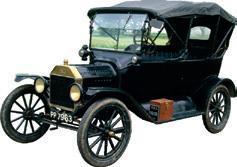It happened this month ... in1931:
Al Capone jailed
On October 17, gangster Al Capone was sentenced to 11 years in prison for tax evasion and fined $80,000, signaling the downfall of one of the most notorious criminals of the 1920s and 1930s. Earning his nickname “Scarface” after being sliced across the cheek during a fight, Capone became Chicago’s crime kingpin by wiping out his competitors through a series of gangland battles and slayings, including the infamous St. Valentine’s Day Massacre in 1929, when Capone’s men gunned down seven rivals. Among Capone’s enemies was federal agent Elliot Ness, who led a team of officers known as “The Untouchables” because they couldn’t be corrupted. Ness and his men routinely broke up Capone’s bootlegging businesses, but it was tax-evasion charges that finally stuck and landed Capone in prison.
... in1908:
Model T Ford debuts
Released on October 1, the Model T, sold by the Ford Motor Company from 1908 to 1927, was the earliest effort to make a car that most people could actually buy. Fashioned from vanadium alloy steel, it offered superior strength despite its light weight, and was the first Ford with all its parts built by the company itself. Selling for $850, it was considered a reasonable value, though still slightly higher than the income of the average American worker. After selling 10,607 Model Ts, founder Henry Ford announced that the company would cease to sell the Model R or Model S cars, famously remarking that “Any customer can have a car painted any colour that he wants - so long as it is black.”
... in1922:
Formation of the BBC
The British Broadcasting Company, as the BBC was originally called, was formed on October 18, 1922 by a group of leading wireless manufacturers including Marconi. Daily broadcasting by the BBC began in Marconi’s London studio, 2LO, in the Strand, on November 14. It is the world’s oldest national broadcaster, and the largest broadcaster in the world by number of employees, employing over 22,000 staff in total, of whom more than 16,000 are in public sector broadcasting. From its inception, through the Second World War to the popularisation of television in the post -WW2 era and the internet in the late 20th and early 21st centuries, the BBC has played a prominent role in British life and culture.
68
Please mention Inside Flintshire Magazine when responding to advertisements






